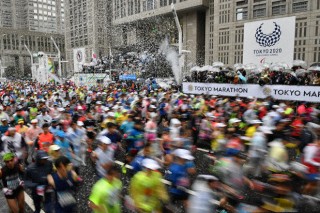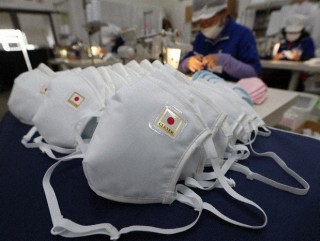Loading
Search
▼ More Focus On Virus Risks And Prevention At Japan Marathons As Cases Rise
- Category:Event
TOKYO -- With the ever-widening spread of the new coronavirus, which is known to cause symptoms of pneumonia, Japan's sports organizations have been formulating plans and responses to reduce the risk of infection to event participants, support staff, spectators and others.
Tokyo 2020 Olympic & Paralympic Games organizers engaged in discussions over how to handle the virus, and Japan's Rugby Top League has canceled its events with players and fans. Elsewhere, professional baseball players currently out at training camp grounds are being cautioned to wear masks when signing autographs for admirers.
But with the marathon season in full swing, organizers for outdoor running races across the country are most on edge. The Tokyo Marathon, which is expecting around 38,000 people to participate on March 1, has come in for particular attention.
Users on Twitter have voiced their concerns about the capital's road race, saying, "If it goes like this I wonder if they can even hold the event," and, "I'm really looking forward to the Tokyo Marathon, so the new coronavirus had better not spread." Another wrote, "The coronavirus has already caused such a fuss, so it should be delayed or canceled."
Following the World Health Organization's (WHO) announcement that the situation around the new coronavirus constituted an emergency, the Tokyo Marathon Foundation published an update on its webpage entitled, "Regarding the infectious illness caused by a new coronavirus."
It said that it intends to continue to investigate preventative measures, and advised both runners, volunteers and others to "stay vigilant by adopting stringent hygiene practices."
The 2020 Tokyo Marathon is doubling as the event for the deciding Olympic men's qualifying contest, called the Marathon Grand Championship (MGC) Final Challenge. Among the competitors for the last remaining berth as a representative of Japan at the Olympics will be the Japanese record holder for a fastest marathon Suguru Osako, who ran one race in 2 hours 5 minutes and 50 seconds, and former record holder Yuta Shitara.
In addition to the runners, around 11,000 people are set to help as volunteer assistants, fulfilling roles at reception, guidance and other tasks. Over 1 million people are expected to pack out the sides of the course to cheer on the marathon runners. There will also be people among the crowds handing out food to competitors.
Precisely because it is one of the largest scale events in Japan, and because there is such concern around the coronavirus, interest in how the marathon will be managed is high.
Since February came around, almost every day has seen reports on the number of newly confirmed cases of infection in Japan. But do organizers for public events have concrete plans in response to the outbreak?
On Feb. 12, less than a month away from the starting gun being fired for the Tokyo Marathon, the Tokyo Marathon Foundation responded to a request for comment from the Mainichi Shimbun: "At present, we are closely watching the situation while going ahead with our preparations for the event."
It continued, "We are continuing to examine preventative measures in accordance with changes in the situation, and in compliance with requests from government bodies and others we will be flexible in how we hold the event."
According to a public relations official at the foundation, a team focusing on virus prevention was established at the organization on Jan. 27. It is proceeding with its measures based on consultations with medical professionals and experts from outside the company.
The official also said, "With regards to concrete measures, we are investigating whether to distribute masks to people who want them in areas close to the runner receptions open until the day before the race (the two receptions are both in Toyosu in the capital's Koto Ward) and the changing areas at the finish line. However, it may be an issue as to whether we can obtain the masks."
But among experts, some believe that the chances of contracting the virus at marathons are limited. Tetsuo Kase, a lecturer at Osaka City University's graduate school specializing in virology, said, "Essentially, the new coronavirus is said to spread by airborne droplets.
Many reports are coming through, but the key thing to bear in mind is 'close contact.'
"In interior spaces such as homes or hospitals, air doesn't move around very much, meaning that if you encounter someone with the virus and then you come near them, it's a form of close contact.
"But in the case of the marathon, although there will be a large number of people gathered in one place, the event is held outdoors. It makes it harder for close contact to take place." It appears then that vigilance is required not when out at the race itself, but at the reception before the event starts.
Koji Wada, a professor in public health at the International University of Health and Welfare in Tochigi Prefecture, eastern Japan, acknowledged that because most infections are thought to be transmitted by airborne droplets, the risk for an outside event like a marathon is lower than indoor events.
But he added, "If the race goes ahead, then preventative measures will be under consideration around runners' temperature checks, volunteers' maintenance of their own health, and even whether people should refrain from coming to see the race. It will probably have to be based on how far the virus has spread in Japan by that time, but while considering people's concerns, a consensus must be reached."
Organizers of other public marathons outside of Tokyo are also struggling with how to respond to a potential viral outbreak. The Kyoto Marathon, set to go ahead in western Japan on Feb. 16, will bring together around 30,000 runners and volunteers.
In January, a Ministry of Health, Labor and Welfare announcement that a foreign student from China living in Kyoto had been infected with the virus reportedly caused a number of people to enquire as to whether the marathon would still go ahead.
A head of the marathon executive committee's public relations department said, "We want to say that we'll be primarily distributing masks to our volunteer staff working indoors, but the products are sold out everywhere, so it's a cause for concern."
The World Heritage Himeji Castle Marathon, taking place in the western Japan prefecture of Hyogo on Feb. 23, is experiencing similar difficulties. Around 15,000 runners and volunteers will take part, but an official of the event's safety planning division said, "At present, we think we'll be asking volunteers and others connected with the marathon to use alcoholic disinfectant and masks. We think that there could be changes depending on what happens in the country, so we're closely monitoring the situation."
On Feb. 12, less than a month away from the starting gun being fired for the Tokyo Marathon, the Tokyo Marathon Foundation responded to a request for comment from the Mainichi Shimbun: "At present, we are closely watching the situation while going ahead with our preparations for the event."
It continued, "We are continuing to examine preventative measures in accordance with changes in the situation, and in compliance with requests from government bodies and others we will be flexible in how we hold the event."
According to a public relations official at the foundation, a team focusing on virus prevention was established at the organization on Jan. 27. It is proceeding with its measures based on consultations with medical professionals and experts from outside the company.
The official also said, "With regards to concrete measures, we are investigating whether to distribute masks to people who want them in areas close to the runner receptions open until the day before the race (the two receptions are both in Toyosu in the capital's Koto Ward) and the changing areas at the finish line. However, it may be an issue as to whether we can obtain the masks."
But among experts, some believe that the chances of contracting the virus at marathons are limited. Tetsuo Kase, a lecturer at Osaka City University's graduate school specializing in virology, said, "Essentially, the new coronavirus is said to spread by airborne droplets.
Many reports are coming through, but the key thing to bear in mind is 'close contact.'
"In interior spaces such as homes or hospitals, air doesn't move around very much, meaning that if you encounter someone with the virus and then you come near them, it's a form of close contact.
"But in the case of the marathon, although there will be a large number of people gathered in one place, the event is held outdoors. It makes it harder for close contact to take place." It appears then that vigilance is required not when out at the race itself, but at the reception before the event starts.
Koji Wada, a professor in public health at the International University of Health and Welfare in Tochigi Prefecture, eastern Japan, acknowledged that because most infections are thought to be transmitted by airborne droplets, the risk for an outside event like a marathon is lower than indoor events.
But he added, "If the race goes ahead, then preventative measures will be under consideration around runners' temperature checks, volunteers' maintenance of their own health, and even whether people should refrain from coming to see the race. It will probably have to be based on how far the virus has spread in Japan by that time, but while considering people's concerns, a consensus must be reached."
Organizers of other public marathons outside of Tokyo are also struggling with how to respond to a potential viral outbreak. The Kyoto Marathon, set to go ahead in western Japan on Feb. 16, will bring together around 30,000 runners and volunteers.
In January, a Ministry of Health, Labor and Welfare announcement that a foreign student from China living in Kyoto had been infected with the virus reportedly caused a number of people to enquire as to whether the marathon would still go ahead.
A head of the marathon executive committee's public relations department said, "We want to say that we'll be primarily distributing masks to our volunteer staff working indoors, but the products are sold out everywhere, so it's a cause for concern."
The World Heritage Himeji Castle Marathon, taking place in the western Japan prefecture of Hyogo on Feb. 23, is experiencing similar difficulties. Around 15,000 runners and volunteers will take part, but an official of the event's safety planning division said, "At present, we think we'll be asking volunteers and others connected with the marathon to use alcoholic disinfectant and masks. We think that there could be changes depending on what happens in the country, so we're closely monitoring the situation."
- February 15, 2020
- Comment (0)
- Trackback(0)



